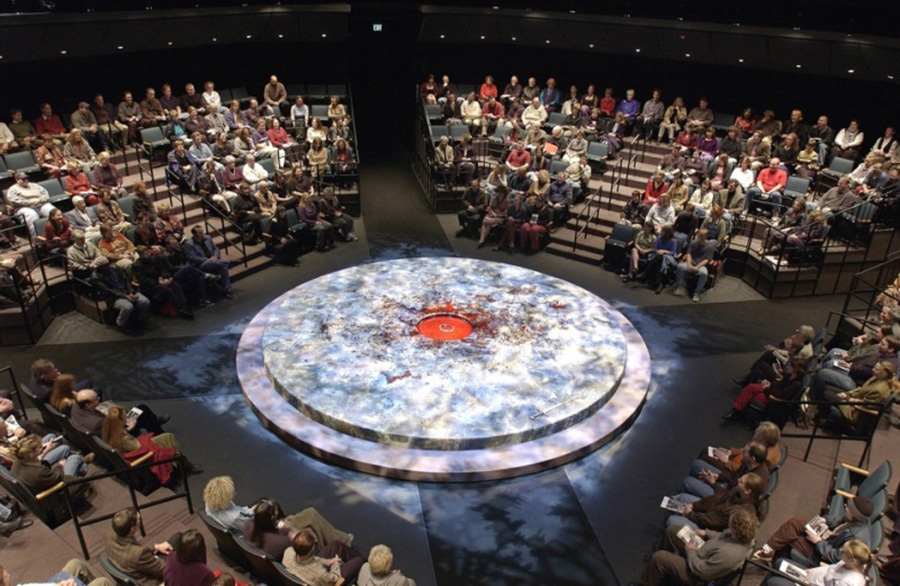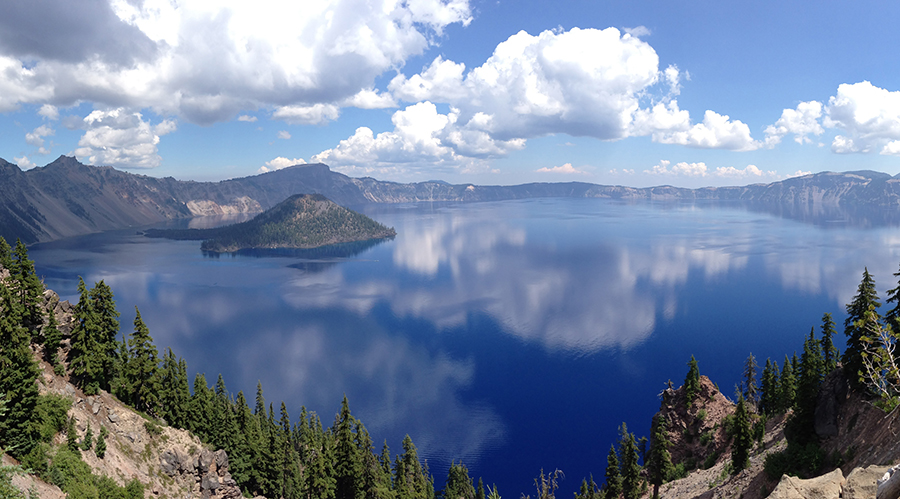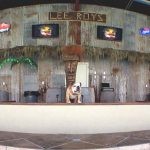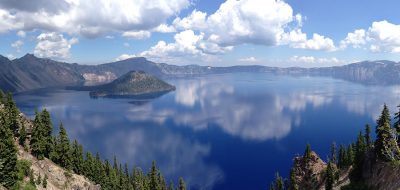|
Visit the Rogue River RV trip with a heavy dose of Shakespeare.
A collage of breathtaking landscapes that vary from parched desert terrain to majestic mountains, thick forests, rushing rivers and tranquil lakes, Southern Oregon is a world apart from Oregon’s wetter, Pacific Coast region. An incredible selection of active adventures lures travelers wild at heart. Mile after mile of hiking and biking trails, superb wildlife-watching and exhilarating white-water adventures on the Rogue River are crowned by one of the nation’s scenic wonders: Crater Lake.
Southern Oregon certainly doesn’t fall short when it comes to the finer things in life. With charming chocolate-box towns dotted with excellent bars, cafés and restaurants, renowned boutique wineries, world-class cultural institutions and the mother of all North American Shakespeare festivals, this fascinating tranche of the American West is an epic feast for mind and body.
Ashland
Close to Interstate 5 amid the Siskiyou Mountains, the former mill town of Ashland is one of the most cosmopolitan and alluring towns in Oregon. The city’s cultural cred has grown on the back of its internationally renowned Shakespeare festival, which runs from mid-February to early November. The festival dates to 1935, when an English professor and Bard-lover named Angus Bowmer staged a performance of Shakespeare’s “Twelfth Night.” Each year, the festival features 11 plays on three stages. Since the festival’s inception, it has presented all of Shakespeare’s 37 plays several times.

Awaiting a performance at the Thomas Theater. Photo: Amy Richards
A magnet for jet-setting actors and theater lovers, Ashland has fostered a dynamic arts community that revels in the town’s chic bars, fancy restaurants, contemporary galleries and live music venues. Ashland’s famed Lithia Springs mineral waters lure holistic health gurus and spa-goers keen to decompress, while a growing number of local wineries provide tastes of the region’s acclaimed varietals in picturesque settings. During the quieter winter months, outdoorsy locals ski the 7,532-foot Mount Ashland, a nonprofit-run ski area with 23 ski runs across more than 200 acres.
While Shakespearean theater takes center stage during much of the year, the city’s perennial gem is 100-acre Lithia Park, an urban paradise with emerald lawns, tennis courts, picnic areas and dazzling landscaping. Just steps away from the festival’s theaters, the park follows Ashland Creek through rugged woodlands. Visitors also can explore the park’s Japanese garden and rose garden. The urban gem has so impressed open-space experts that Lithia Park was ranked as one of the top 10 Great American Spaces by the American Planning Association.
Klamath Falls
In the high desert (4,100 feet elevation), just east of the southern Cascade Mountain Range, the Klamath Falls region provides the gateway to adventure. The region’s compelling and diverse landscapes furnish superb opportunities for summertime hiking, biking, boating and wildlife-watching, not to mention snow sports in the winter.
The Klamath River Basin draws nature lovers to several wildlife preserves and national forests with vibrant ecosystems that include lakes, rivers, marshes and wetlands, providing refuge to bald eagles and waterfowl. Accessed from the Klamath Falls trailhead, the 100-mile OC&E Wood Line State Trail follows a defunct rail bed and draws seasoned hikers, mountain bikers and equestrians.
For a dose of culture in town, the Favell Museum features a prized collection of Native American artifacts, including arrowheads, ancient stone tools and miniature guns.
Crater Lake
One of Oregon’s most iconic attractions, Crater Lake National Park is home to the clearest and deepest lake in the U.S. It’s certainly one of the most spectacular bodies of water to behold, with its impossibly blue, crystalline water ringed by daunting cliffs. Formed when Mount Mazama erupted with catastrophic force some 7,700 years ago — viewed by geologists as one of the most cataclysmic geologic incidents over the course of human history — the volcano collapsed in on itself and created a colossal caldera 6 miles wide and almost 4,000-feet deep, which eventually filled with rain and snowmelt.
One of the strangest sites here is the Old Man of the Lake, a tree stump that has been floating vertically in the lake for over 120 years. The lake also is home to two small islands: Wizard Island, the remnants of a cinder cone that erupted after the lake began to fill with water, and Phantom Ship, a thin, sparsely wooded isle that eerily resembles a sailing vessel.
While most visitors show up simply for the visuals, there are plenty of options for communing nature. Outdoor recreation opportunities include boat tours that involve a hike down to the water on the 2.2-mile round-trip Cleetwood Cove trail. About 50 miles north of Crater Lake, Toketee Falls is a feast for the eyes. Here, a curtain of water plunges 120 feet at the confluence with the North Umpqua River and Clearwater River.
Medford
Nestled within the breathtaking Rogue Valley and bathed in 200-plus days of sunshine a year, Medford combines creative flair with beauty and adventure.
Emblematic of the city’s passion for the arts, the Craterian Theater at the Collier Center is a local institution that has been hosting world-class performances since 1924. A short five-mile drive away in Jacksonville, the Britt Music and Arts Festival, located on the estate of acclaimed 19th-century photographer Peter Britt, hosts a stellar lineup of concerts throughout the summer that draws music lovers from across the nation.
Medford is the latest town to catch on to Oregon’s passion for craft brewing with a growing number of excellent breweries, including the Bricktowne Brewing Company and the Medford Brewing Company serving innovative craft beer selections in eclectic spaces.
Within striking distance of the Rogue River, Medford is an outdoor lover’s basecamp with hiking, biking, jet boating, kayaking and zip lining. There’s rewarding wildlife-watching at Lower Table Rock near Medford, a local landmark and former gathering place for Native Americans and settlers traveling the Oregon-California Trail. Rising some 800 feet above the Rogue River Valley, the Table Rocks are 7-million-year-old remnants of lava flows that are now clothed with grassy mounds and over 200 wildflower species, including the rare dwarf-wooly meadow foam.
Kids and adults alike appreciate the Medford Railroad Park, which features old train cars and locomotives, including a caboose and a hopper car. The city’s largest park, Don Jones Memorial Park, is best in the summer, when the water spray section opens up for kids to play in. There’s also a memorial here to Fallen War Heroes from the Civil, Spanish-American, and Korean wars as well as World Wars I and II.
Grants Pass
A place where the modern and the historic coalesce within a beautiful setting, Grants Pass is an all-things-to-all-people kind of town. Billed as the region’s white-water rafting capital, the Rogue River (preserved as a National Wild and Scenic River) snakes through town and provides on-the-water adventures for every mood and moment. For an adrenaline rush and spectacular scenery, visitors can take a 36-mile jet boat trip (two hours) through the dramatic Hellgate Canyon.
There are wilderness hiking and camping trips along the 40-mile Rogue River Trails, as well as rafting and kayaking on a 33-mile section of the river. With its eclectic boutiques, antique stores, distinctive 19th-century brick homes and buildings, not to mention the historic Rogue Theatre (built in 1938), Grants Pass National Historic District channels the spirit of the American West with a folksy twist.
Check out the state’s longest-running outdoor growers and crafters markets to make a once-in-a-lifetime purchase. Cross the award-winning pedestrian bridge over the Rogue River and explore the bustling Josephine County Fairgrounds.
Standing at the heart of the Applegate Valley wine region, Grants Pass also forms an excellent base for the Applegate Valley Wine Trail, where close to 30 wineries and tasting rooms offer tours and wine in a poised ambiance accompanied by picturesque views over the Applegate Valley.
Myrtle Creek
Settled by gold prospectors in the 1840s, Myrtle Creek’s fortunes have ebbed and flowed with the price of timber; the region’s prodigious forests led to the creation of more than 250 mills when the timber industry reached its zenith following World War II. Nowadays, Millsite Park serves as the epicenter for the surrounding attractions.
The North, one of Oregon’s most scenic waterways, delivers a pulse-quickening roster of recreational activities with exhilarating white-water action. Rafters and kayakers can test their skills on a wide range of conditions, from placid Class I waters to roaring Class IV rapids. For more relaxed pursuits, the South Umpqua River, which runs through Myrtle Creek, is a magnet for anglers. Beyond the prized fishing, the river provides bewitching scenery and prime wildlife-watching in the form of blacktail deer, mink, raccoon, beavers, otters, osprey, blue heron and bald eagles.
Discover more Oregon RV adventures.
For More Information
Oregon Tourism Commission
800-547-7842
www.traveloregon.com






